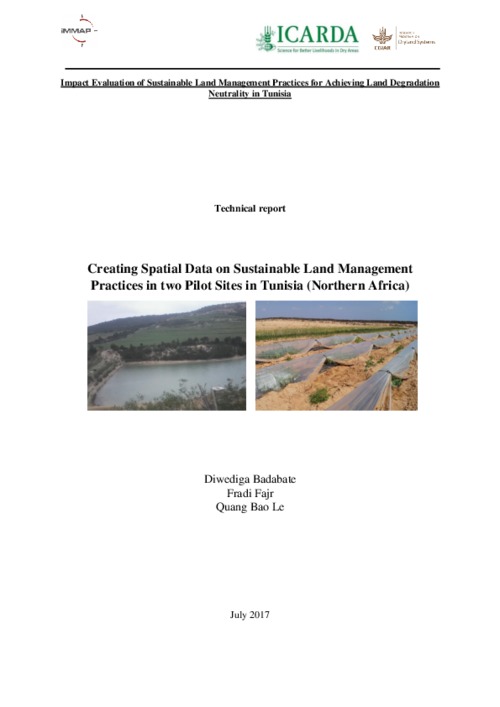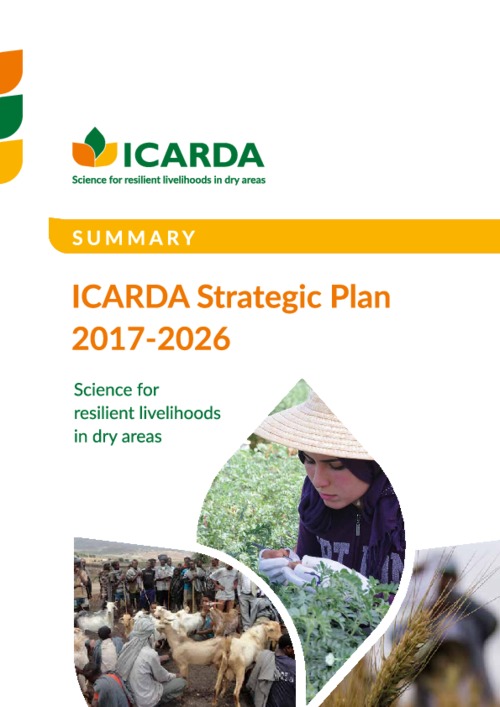Location
The International Center for Agricultural Research in the Dry Areas (ICARDA) was established in 1977. It is one of 15 such centers supported by the CGIAR. ICARDA’s founding mandate to promote agricultural development in the dry areas of developing countries remains highly relevant today.
ICARDA works with a tight focus on the problem-solving needs of resource-poor farmers, achieving this through the in-field delivery of its research outputs. Although global food production has increased by 20 per cent in the past decade, food insecurity and poverty remain widespread, while the natural resource base continues to decline.
International research centers such as ICARDA, which have helped drive previous improvements, continue to deliver new technologies to support sustainable growth in agriculture, and crucially, to work with a wide range of partners to accelerate the dissemination of these technologies.
ICARDA’s biggest strength is its staff – 600 highly skilled men and women from 32 countries. Our research and training activities cover crop improvement, water and land management, integrated crop-livestock-rangeland management, and climate change adaptation.
Other interventions include:
- Water harvesting - supplemental irrigation and water-saving irrigation techniques
- Conservation agriculture methods to reduce production costs and improve sustainability
- Diversification of production systems to high-value crops – horticulture, herbal and medicinal plants
- Integrated crop/rangeland/livestock production systems including non-traditional sources of livestock feed
- Empowerment of rural women – support and training for value-added products.
The ICARDA genebank holds over 135,000 accessions from over 110 countries: traditional varieties, improved germplasm, and a unique set of wild crop relatives. These include wheat, barley, oats and other cereals; food legumes such as faba bean, chickpea, lentil and field pea; forage crops, rangeland plants, and wild relatives of each of these species.
ICARDA’s research portfolio is part of a long-term strategic plan covering 2007 to 2016, focused on improving productivity, incomes and livelihoods among resource-poor households.
The strategy combines continuity with change – addressing current problems while expanding the focus to emerging challenges such as climate change and desertification.
We work closely with national agricultural research systems and government ministries. Over the years the Center has built a network of strong partnerships with national, regional and international institutions, universities, non-governmental organizations and ministries in the developing world and in industrialized countries with advanced research institutes.
THE ‘DRY AREAS’
Research and training activities cover the non-tropical dry areas globally, using West Asia, North Africa, Central Asia and the Caucasus as research platforms to develop, test, and scale-out new innovations and policy options.
Dry areas cover 41 per cent of the world’s land area and are home to one-third of the global population. About 16 per cent of this population lives in chronic poverty, particularly in marginal rainfed areas. The dry areas are challenged by rapid population growth, frequent droughts, high climatic variability, land degradation and desertification, and widespread poverty. The complex of relationships between these challenges has created a "Poverty Trap."
Members:
Resources
Displaying 86 - 90 of 431Overview of interface of the sustainable land management (SLM) tool
Under the Economics of Land degradation initiative (ELD), scientists from ICARDA are collaborating with developments to develop the GeOC tool. It is a new web-based GIS tool to define context specific options for sustainable land management required to achieve Land Degradation Neutrality (LDN).
This video illustrates the interface of the SLM tool of the GeOC tool.
To check the GeOC tool, please follow this link: http://geoc.mel.cgiar.org
Creating Spatial Data on Sustainable Land Management Practices in two Pilot Sites in Tunisia (Northern Africa)
Many efforts have been invested in the Dry Areas to combat land degradation and desertification. Different strategies and approaches for conserving soil and water and restoring degraded lands have been developed by local, national and international agents to synergise efforts towards land degradation neutrality achievement. Tunisia is a dryland country facing a high risk of land degradation over more than 50% of its territory. It is a country with high investment programs for soil and water conservation (SWC), and large level adoption of SLM practices.
ICARDA Strategic Plan 2017 - 2026
This document presents the Strategic Plan of the International Center for Agricultural Research in the Dry Areas for the period from 2017 to 2026. ICARDA’s mission is to enhance food, water, and nutritional security and environmental health in the face of global challenges, including climate change. Through preparedness for change and productivity gains in the rural economy, ICARDA will contribute to poverty reduction and social stability as our overarching goal. Innovative science, partnerships for impact, capacity development, and a fit-for-purpose organization are our tools.
ICARDA’s New Strategic Plan 2017-2026 Highlights
Non-tropical dry areas cover over 40% of the world’s land surface with a growing population of more than 2.5 billion people. These people grow 44% of the world’s food and keep half of the world’s livestock, yet one in six live in chronic poverty. Dry areas also face major challenges, including insufficient rainfall, climate variability and change, land degradation, desertification, recurring droughts, temperature extremes, high population growth, widespread poverty, and unemployment.
ICARDA Strategic Plan 2017-2026 Summary
To help break the cycle of poverty, improve food and nutritional security, halt or reverse the alarming process of resource degradation in the dry areas, and help communities adapt to the impacts of climate variability and change, ICARDA’s Strategic Plan 2017-2026 outlines our research and organizational approach for action to achieve our vision of thriving and resilient communities in the dry areas of the developing world.







